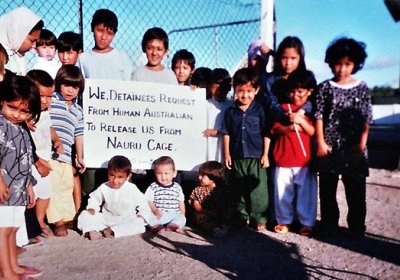When NSW members of parliament from both Labor and Coalition start campaigning against coal seam gas (CSG) — and the federal Labor Party starts musing that it might impose “strict regulations” on state governments to control the industry — you know that the movement against this dirty fossil fuel is starting to pack a punch.
CSG was hardly known two years ago. Today, the thought of it frightens people. Gas companies have poured millions into advertising to reassure people that the industry is safe — but it hasn’t worked.
Australia
Lip-stitching and attempted self-immolation are among increasingly extreme acts of self-harm taking place in Australia’s two offshore detention camps in recent weeks.
Hunger strikes, cutting and attempted hangings have already become widespread in the tent city on Nauru. But, on February 19, for the first time since the “dark days” of former prime minister John Howard’s “Pacific solution,” refugees stitched their mouths closed to protest their arbitrary and indefinite detention.
This statement was released by Stop CSG Illawarra on February 19.
***
The NSW government has announced new coal seam gas (CSG) rules, including a ban on CSG development in residential areas and critical industry clusters, such as horse breeders and wine producers. But they also stated this would only apply to new CSG exploration, assessment and production activities, and they have not ruled out drinking water catchments.
This statement was released by the Socialist Alliance Moreland councillor Sue Bolton on February 20.
***
Experienced crane driver and union activist Billy Ramsay was killed on the Grocon construction site in central Melbourne on February 18. This news was buried many pages inside the Murdoch-owned Herald Sun daily tabloid.
Simon Butler was a 25-year-old activist who helped organise the mass mobilisations in Sydney in February and March 2003 against the invasion of Iraq. He was also a leader of the socialist youth group Resistance and the student anti-war movement Books Not Bombs, which Resistance initiated.
As one who took part in demonstrations against the war in Vietnam, I could hardly believe it when the US “war machine” resurrected itself and began its march on Iraq.
Appalled by what appeared to be happening, I was delighted to discover, following a rally in November 2002, that a local peace group had been created. I joined that group and began actively campaigning for peace which I continue to this day.
Northern Territory Chief Minister Terry Mills announced a deal on February 8 to secure power for the Nhulunbuy bauxite mine and alumina refinery. The deal was hailed as saving the community through protecting the industry that provides it with half its jobs.
But the decision has disastrous environmental impacts and shows the lack of choices available to remote communities under the logic of the mining market. To survive, communities are asked to provide public funds to private companies to perform environmentally damaging activity.
This is an extract from a zine written by Resistance members. You can pick up a copy from a Resistance stall on campus during Orientation week.
***
Like any other day, a female student is on her way to campus. As she rides her bike down the main road, a head pops out a moving car window and yells out to her: “Nice legs!” Later that day she receives a text from one of the men in her group assessment task who she barely knows: “Hey beautiful we should definitely have a beer sometime ;)”.
Britain’s House of Commons voted in favour of equal marriage rights on February 5. France’s lower house approved a bill for equal marriage rights on February 12.
If these bills make it the rest of the way through their respective parliaments, Britain and France will join the Netherlands, Belgium, Canada, Massachusetts, Spain, South Africa, Norway, Sweden, Portugal, Iceland, Argentina and Denmark in having equal marriage rights.
Federal environment minister Tony Burke has rejected National Heritage listing for the Tarkine wilderness.
On February 8, Burke announced 10 new mines proposed over the next five years for the Tarkine wilderness area. Nine of these 10 mines will be open cut leaving scars of devastation in an area of north-western Tasmania.
Figures released by the department of immigration showed the number of refugees held in Australian mainland detention peaked at 10,271 in November last year, the highest since mandatory detention began.
This included housing and alternative places of detention, but not the almost 400 men held on Nauru by that time.
Children made up 1221 of those held in detention as at December, another record high. The last time more than 1000 children were held in detention, the government was forced to allow more than half to be released.
More than 30,000 Victorian teachers and education support (ES) staff walked off the job on February 14 in their campaign for better pay and conditions.
Government figures show that 65% of school staff took part in strike action and 300 schools did not have students. Meredith Peace, Australian Education Union (AEU) state president, also reported that more than 300 schools were brought to a standstill and that every school in the state had some form of disruption.
- Previous page
- Page 670
- Next page







